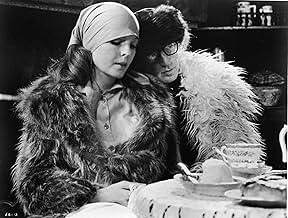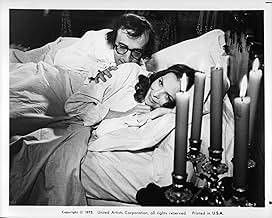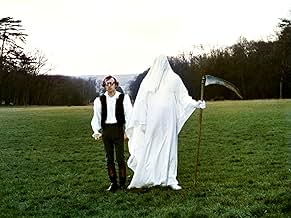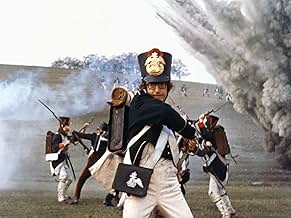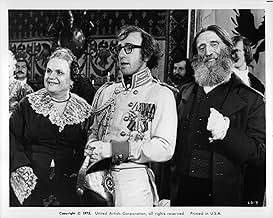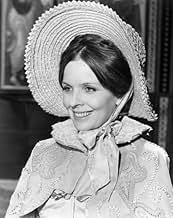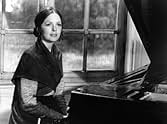PUNTUACIÓN EN IMDb
7,6/10
43 mil
TU PUNTUACIÓN
En la Rusia de los zares, un soldado neurótico y su primo lejano planean el asesinato de Napoleón.En la Rusia de los zares, un soldado neurótico y su primo lejano planean el asesinato de Napoleón.En la Rusia de los zares, un soldado neurótico y su primo lejano planean el asesinato de Napoleón.
- Premios
- 1 premio y 1 nominación en total
Féodor Atkine
- Mikhail
- (as Feodor Atkine)
Yves Barsacq
- Rimsky
- (as Yves Barsaco)
Gérard Buhr
- Servant
- (as Gerard Buhr)
Henri Czarniak
- Ivan
- (as Henry Czarniak)
Reseñas destacadas
"Love and Death" is one of Woody Allen's "early, funny ones," before he made darker and more serious films, such as "Stardust Memories" (1980) where Allen's line about his own oeuvre originates. He made "Annie Hall" (1977) next, and his career would never be the same. On the other hand, being a parody of 19th-century Russian literature, "Love and Death" is full of esoteric references. The major throughline is Leo Tolstoy's "War and Peace," but there's enough Fyodor Dostoevsky here for me to have reviewed it as part of my mission to see a bunch of "Crime and Punishment" pictures after reading the book. Moreover, Allen would go on to make three movies (thus far) more heavily and singularly inspired by this particular novel: "Crimes and Misdemeanors" (1989), "Match Point" (2005) and "Irrational Man" (2015). It's interesting to compare how he went from "Love and Death," which is non-stop comedic frivolity complete with a gag being performed at every moment to "Match Point," where there are no jokes.
Indeed, "Love and Death" is not only an homage to literature, but also to early screen comics. There's even a scene where the sound goes out for some silent slapstick, and the fourth-wall-breaking absurdity of the whole thing seems to be especially indebted to the Marx Brothers. As for the Russian connection, though, there are extended mock-philosophical discussions, angst over the existence of God, somber soliloquies, multiple suitors and lovers for everyone, subplots upon subplots and periphery character galore, a lot to do with class and nationality, and... wheat, I guess. (I love that in a blog post from Alistair Ian Blyth that one of my favorite films of the 1910s, "After Death" (1915), which is based on the prose of Ivan Turgenev, is brought up to help explain the supposed importance of wheat in Russian literature.)
Some of the Dostoevsky references are obvious. Allen has a conversation in a jail cell that entirely exists of characters and titles from his stories, including some gossip about a local named "Raskolnikov" who murdered two women. Additionally, Diane Keaton's character is named "Sonja," the hooker with a heart of gold who instigates Raskolnikov's regeneration in the book. "Love and Death" offers the best character summary of Sonja, though, from her own lips: "I'm half saint, half wh-re" (IMDb censorship, you know). And, naturally, Allen plays the atheistic foil to her pious promise land. Best of all, however, is how the connection with Napoleon between "War and Peace" and "Crime and Punishment" is exploited in this film with two other words surrounding the conjunction. Sonja decides that she and Allen's Boris should kill Napoleon for the benefit of humanity, which is akin to the rationale of Raskolnikov for murdering the pawnbroker. Ironically, Napoleon was also his role model for this "extraordinary" act. Boris mixes up the roles further by comparing himself to an insect, which is what Raskolnikov said of the pawnbroker, and claiming Napoleon as a great man. Looking at the parodic adaptation this way gives one as much whiplash as Allen and Keaton's philosophical repartee. To top it off, there are two Napoleons.
There are some allusions to non-comedic films here, too. The ones to "Battleship Potemkin" (1925) and "Persona" (1966) seemed most conspicuous to me. Although "Love and Death" is a lightweight affair, and the jokes are hit and miss, it rewards those who've seen and read what it parodies. And, admittedly, Russian novels such as "Crime and Punishment" were just asking for this sort of loving pillory.
Indeed, "Love and Death" is not only an homage to literature, but also to early screen comics. There's even a scene where the sound goes out for some silent slapstick, and the fourth-wall-breaking absurdity of the whole thing seems to be especially indebted to the Marx Brothers. As for the Russian connection, though, there are extended mock-philosophical discussions, angst over the existence of God, somber soliloquies, multiple suitors and lovers for everyone, subplots upon subplots and periphery character galore, a lot to do with class and nationality, and... wheat, I guess. (I love that in a blog post from Alistair Ian Blyth that one of my favorite films of the 1910s, "After Death" (1915), which is based on the prose of Ivan Turgenev, is brought up to help explain the supposed importance of wheat in Russian literature.)
Some of the Dostoevsky references are obvious. Allen has a conversation in a jail cell that entirely exists of characters and titles from his stories, including some gossip about a local named "Raskolnikov" who murdered two women. Additionally, Diane Keaton's character is named "Sonja," the hooker with a heart of gold who instigates Raskolnikov's regeneration in the book. "Love and Death" offers the best character summary of Sonja, though, from her own lips: "I'm half saint, half wh-re" (IMDb censorship, you know). And, naturally, Allen plays the atheistic foil to her pious promise land. Best of all, however, is how the connection with Napoleon between "War and Peace" and "Crime and Punishment" is exploited in this film with two other words surrounding the conjunction. Sonja decides that she and Allen's Boris should kill Napoleon for the benefit of humanity, which is akin to the rationale of Raskolnikov for murdering the pawnbroker. Ironically, Napoleon was also his role model for this "extraordinary" act. Boris mixes up the roles further by comparing himself to an insect, which is what Raskolnikov said of the pawnbroker, and claiming Napoleon as a great man. Looking at the parodic adaptation this way gives one as much whiplash as Allen and Keaton's philosophical repartee. To top it off, there are two Napoleons.
There are some allusions to non-comedic films here, too. The ones to "Battleship Potemkin" (1925) and "Persona" (1966) seemed most conspicuous to me. Although "Love and Death" is a lightweight affair, and the jokes are hit and miss, it rewards those who've seen and read what it parodies. And, admittedly, Russian novels such as "Crime and Punishment" were just asking for this sort of loving pillory.
One of the funniest movies of all time. The War & Peace and Chekov slant gives it a great feel. Allen and Keaton are at their best, and funnier than Grace & Burns, Hepburn & Tracey, etc..
One of the better lines, "To love is to suffer. To avoid suffering one must not love, but then one suffers from not loving. Therefore, to love is to suffer, not to love is to suffer, to suffer is to suffer. To be happy is to love, to be happy then is to suffer but suffering makes one unhappy, therefore to be unhappy one must love or love to suffer or suffer from too much happiness. I hope you're getting this down."
This classic comedy is very rarely known, and worth watching it over and over.
One of the better lines, "To love is to suffer. To avoid suffering one must not love, but then one suffers from not loving. Therefore, to love is to suffer, not to love is to suffer, to suffer is to suffer. To be happy is to love, to be happy then is to suffer but suffering makes one unhappy, therefore to be unhappy one must love or love to suffer or suffer from too much happiness. I hope you're getting this down."
This classic comedy is very rarely known, and worth watching it over and over.
When Napoleon invades the Russian Empire during the Napoleonic wars, Boris Grushenko (Woody Allen), a "militant coward" and pacifist scholar, is forced to enlist in the Russian Army, desperate and disappointed hearing the news that his cousin Sonja (Diane Keaton) is to wed a herring merchant.
The film is full of philosophical and pseudo-philosophical commentary. In one instance, a priest suggests that Spinoza proves God's existence. Boris and Sonja banter back and forth about epistemology and such, and only once does Sonja really offer any advice worth taking in: that "to love is to suffer and to not know love is to suffer", which really amounts to little more than "life is suffering", something the Buddhists or Schopenhauer would have embraced.
But then again, you have wise men spouting off silliness, including the view that German Jews have stripes, and Russian Jews have horns. We are left to conclude, as Boris quickly does, that being logical in an illogical world is a complex and unfavorable situation.
It has been said that the use of Sergei Prokofiev for the soundtrack adds to the Russian flavor of the film. Other parts referencing Russian culture include a dialogue between Boris and his father with each line alluding to or being composed entirely of Dostoevsky titles. This is crucial to really get the point of how backwards everything was across.
I was not able to fully appreciate the film because I am ignorant of its references to the works of Bergman (notably "Persona" and "Smiles of a Summer Night"). But that is true of much of Allen's work, I think. His constant references to Dostoevsky did reach me but may have been missed by others. Yet, even if few completely "get" the picture, it remains beautiful and humorous just the same. Allen has called this his favorite picture, even more so than "Annie Hall". I have to see more to be sure, but as of now I am inclined to agree.
The film is full of philosophical and pseudo-philosophical commentary. In one instance, a priest suggests that Spinoza proves God's existence. Boris and Sonja banter back and forth about epistemology and such, and only once does Sonja really offer any advice worth taking in: that "to love is to suffer and to not know love is to suffer", which really amounts to little more than "life is suffering", something the Buddhists or Schopenhauer would have embraced.
But then again, you have wise men spouting off silliness, including the view that German Jews have stripes, and Russian Jews have horns. We are left to conclude, as Boris quickly does, that being logical in an illogical world is a complex and unfavorable situation.
It has been said that the use of Sergei Prokofiev for the soundtrack adds to the Russian flavor of the film. Other parts referencing Russian culture include a dialogue between Boris and his father with each line alluding to or being composed entirely of Dostoevsky titles. This is crucial to really get the point of how backwards everything was across.
I was not able to fully appreciate the film because I am ignorant of its references to the works of Bergman (notably "Persona" and "Smiles of a Summer Night"). But that is true of much of Allen's work, I think. His constant references to Dostoevsky did reach me but may have been missed by others. Yet, even if few completely "get" the picture, it remains beautiful and humorous just the same. Allen has called this his favorite picture, even more so than "Annie Hall". I have to see more to be sure, but as of now I am inclined to agree.
For me Love & Death and Sleeper were Allen's zenith for slapstick, one-liner comic-gag comedy. After the relatively immature but amusing Bananas & Everything You always Wanted To Know About Sex, Allen goes up a notch in the intellectual comedy stakes to produce this fine send-up of Russian culture & historical caricature.
Even though some of the one-liner jokes don't always come off it doesn't matter because you never really get chance to think too much about how droll it is because Allen has another half dozen gags waiting in the wings.
But I've often found that Allen works best when he has a foil for his anarchic humour: and thank the Lord he managed to find the wonderful talent of Ms Keaton. She may not be his intellectual equal but she can run him to ground in nearly everything else. She has a kind of naive charm in this movie, always daydreaming, never really listening to Allen's mutterings & jabberings. And with this naivity brings warmth, humility and a general sense of well being.
At the same time Allen can release all his pentup emotions, fears, neo-neurosis to Keaton knowing full well that she wouldn't have a single notion as to what he was on about.
And thats what makes this partnership so durable whether it be here in Love & Death, or Sleeper, Annie Hall or Manhattan Murder Mystery. The scripts may vary but they're held together by the spontaneity of the two stars.
It should be said also that Love & Death breaks new ground for Allen, because even though he still relies on the childish humour of his earlier films, it is also quite clear that he is more forthcoming with his angst against a problematic world. His philosophic nuances dominate a lot of the film, which he will put to more practical use in his latter films like Annie Hall & Manhattan. But here he gets the mix between jokes & existentualism just right.
Love & Death is quite literally a laugh a minute. Whatever people may say about his recent personal problems it cannot be denied that this guy is a pure talent and should be cherished for what he is - a man that makes the world a happier place, if only for a few hours!
****/*****
Even though some of the one-liner jokes don't always come off it doesn't matter because you never really get chance to think too much about how droll it is because Allen has another half dozen gags waiting in the wings.
But I've often found that Allen works best when he has a foil for his anarchic humour: and thank the Lord he managed to find the wonderful talent of Ms Keaton. She may not be his intellectual equal but she can run him to ground in nearly everything else. She has a kind of naive charm in this movie, always daydreaming, never really listening to Allen's mutterings & jabberings. And with this naivity brings warmth, humility and a general sense of well being.
At the same time Allen can release all his pentup emotions, fears, neo-neurosis to Keaton knowing full well that she wouldn't have a single notion as to what he was on about.
And thats what makes this partnership so durable whether it be here in Love & Death, or Sleeper, Annie Hall or Manhattan Murder Mystery. The scripts may vary but they're held together by the spontaneity of the two stars.
It should be said also that Love & Death breaks new ground for Allen, because even though he still relies on the childish humour of his earlier films, it is also quite clear that he is more forthcoming with his angst against a problematic world. His philosophic nuances dominate a lot of the film, which he will put to more practical use in his latter films like Annie Hall & Manhattan. But here he gets the mix between jokes & existentualism just right.
Love & Death is quite literally a laugh a minute. Whatever people may say about his recent personal problems it cannot be denied that this guy is a pure talent and should be cherished for what he is - a man that makes the world a happier place, if only for a few hours!
****/*****
Although the critics loved Annie Hall and some of Allen's other films more than this one, I think this is his best combination of comedy and philosophy. I would strongly recommend this to any fan of Russian history, comedy, philosophy, or Woody Allen.
¿Sabías que...?
- CuriosidadesIn an interview with 'Esquire' magazine, Woody Allen once said of the making of this movie: "When good weather was needed, it rained. When rain was needed, it was sunny. The cameraman was Belgian, his crew French. The underlings were Hungarian, the extras were Russian. I speak only English - and not really that well. Each shot was chaos. By the time my directions were translated, what should have been a battle scene ended up as a dance marathon. In scenes where Keaton and I were supposed to stroll as lovers, Budapest suffered its worst weather in twenty-five years".
- PifiasThe young Boris has blue eyes, but the adult Boris has brown eyes.
- Citas
Sonja: To love is to suffer. To avoid suffering one must not love. But then one suffers from not loving. Therefore, to love is to suffer; not to love is to suffer; to suffer is to suffer. To be happy is to love. To be happy, then, is to suffer, but suffering makes one unhappy. Therefore, to be unhappy, one must love or love to suffer or suffer from too much happiness. I hope you're getting this down.
- Créditos adicionalesRussian composer Sergei Prokofiev is listed in the credits as "S. Prokofiev," just the way he would have been listed in the credits of a Russian film.
- Versiones alternativasThe MGM DVD release deletes the pre-title Prokofiev overture.
- ConexionesFeatured in V.I.P.-Schaukel: Episodio #7.3 (1977)
Selecciones populares
Inicia sesión para calificar y añadir a tu lista para recibir recomendaciones personalizadas
- How long is Love and Death?Con tecnología de Alexa
- What is the music that plays in the opening and closing credits? Where else might I have heard it?
- Who plays Boris as a youngster?
Detalles
- Fecha de lanzamiento
- País de origen
- Sitio oficial
- Idioma
- Títulos en diferentes países
- L'última nit de Borís Gruixenko
- Localizaciones del rodaje
- Empresa productora
- Ver más compañías en los créditos en IMDbPro
Taquilla
- Presupuesto
- 3.000.000 US$ (estimación)
- Recaudación en Estados Unidos y Canadá
- 20.123.742 US$
- Recaudación en todo el mundo
- 20.123.742 US$
Contribuir a esta página
Sugerir un cambio o añadir el contenido que falta

Principal laguna de datos
What is the Hindi language plot outline for La última noche de Boris Grushenko (1975)?
Responde

